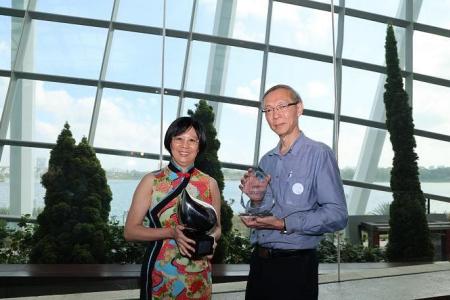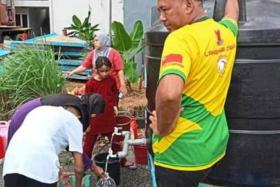SBS Transit, Mee Toh School among winners of PUB awards
What do you do with wastewater from washing buses?
For SBS Transit, the answer was simple: Recycle it, by using underground tanks at the bus depots and separating the water from oil and sludge to make it clean so it can be used again to wash more buses.
To save even more water, new measures such as smaller spray nozzles, which also boosted water pressure for more efficient cleaning, were introduced.
Additional pumps were also installed at the Ulu Pandan and Seletar depots, where the underground tanks were, to transfer more recycled water for bus washing.
The new measures are part of a bus washing efficiency project by SBS Transit and are integrated into the SBS’s Automatic Bus Washing Systems at the two depots.
The project has enabled SBS Transit to save up to 25 per cent of water per bus washed and helped earn the public transport operator the Water Efficiency Award (Projects) – an inaugural award by national water agency PUB to honour projects that have improved water efficiency and showed innovativeness in conserving water.
Ranging from manufacturing plants and data centres to commercial buildings and schools, a total of 42 organisations from the non-domestic sector were lauded this year across the three award categories.
Apart from the Water Efficiency Awards (projects), PUB also presented the Water Efficiency Awards and the Singapore Watermark Awards on March 26.
Speaking at the Flower Field Hall in Gardens by the Bay, Minister for Sustainability and the Environment Grace Fu underlined the need for the non-domestic sector to be more water-efficient.
This is all the more so, as the sector is projected to make up two-thirds of total water demand – an increase from the current half – by the year 2065, said Ms Fu at the awards ceremony.
“Whether you are a business owner, a consumer or environmental advocate, we all have a role to play in ensuring the sustainable use of water,” she added.
Recipients of the Singapore Watermark Awards, Singapore’s highest honour for achievements in water conservation, included Mee Toh School, a primary school in Punggol, in recognition of its long-running water conservation initiatives from 2019 to 2022.
At the school, a group of student leaders known as “environment champions” organise projects for environmental causes and share information on water conservation during school assemblies. They also go on occasional trips outside of school to identify or learn about environmental problems and come up with innovative solutions.
One of these involved recycling.
This happened after a neighbourhood trip one day, when a team of primary four and five pupils observed that some of the bottles inside commingled recycling bins were contaminated and were unsuitable for recycling.
Taking inspiration from school attendants who cleaned the floors using rainwater collected in the school’s rainwater collection tanks, the pupils invented a device that utilises rainwater to clean recyclables.
Called Wishy-Washy, it uses a sensor and a micro:bit, a pocket-sized programmable computer, to detect the recyclables before activating sprinklers for rinsing.
The device is even up for an upgrading – Wishy-Washy 2.0 – after an operations manager of a waste management and recycling facility reviewed it and suggested that the recyclables could be dried at the end.
Separately, Mee Toh School’s operations and support staff also conduct daily checks of the water meter readings in the school to detect underground water pipe leakages so that timely intervention can be taken to minimise water wastage.
These efforts paid off when the school successfully lowered its annual water consumption by 30 per cent between 2019 and 2022.
Last year, it was announced that PUB would raise its funding for water recycling projects to a maximum of $5 million, up from $1 million.
To date, PUB has awarded close to 400 grants for water-efficiency projects, which collectively save 70 million litres of water each day, said Ms Fu.
Get The New Paper on your phone with the free TNP app. Download from the Apple App Store or Google Play Store now



